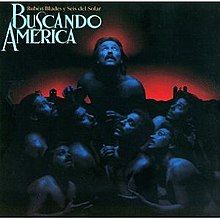Buscando América
| Buscando América | ||||
|---|---|---|---|---|
 | ||||
| Studio album by Rubén Blades & Seis Del Solar | ||||
| Released | April 3, 1984 | |||
| Recorded | May, July & August 1983 | |||
| Studio | Eurosound Studios (Nueva York) | |||
| Genre | ||||
| Label | Elektra[1] | |||
| Producer | Ruben Blades[2] | |||
| Rubén Blades & Seis Del Solar chronology | ||||
| ||||
| Review scores | |
|---|---|
| Source | Rating |
| AllMusic | |
| Christgau's Record Guide | A−[4] |
| The Encyclopedia of Popular Music | |
| MusicHound Rock: The Essential Album Guide | |
| The Rolling Stone Album Guide | |
Buscando América (Searching for America) is the first album by the Rubén Blades and Seis del Solar band released and distributed on April 3, 1984. The production, under the Elektra label, fuses different musical rhythms such as salsa, reggae, rock, and jazz Latin. The album was recorded at Eurosound Studios in New York between May and August 1983.
With songs having political and social content and given their content of political questioning, some tracks had problems being broadcast on the radio; such as "Desapariciones", later covered by other musicians.[6][7] The album received a Grammy nomination for Best Tropical Latin Performance.[8]
Production
[edit]The album was recorded with the six musicians of Seis Del Solar.[5] The lyrics were printed inside the album in both Spanish and English.[9]
Critical reception
[edit]The New York Times wrote that "the musicians, most of whom have labored for years on the salsa circuit, respond to Mr. Blades's creativity and risk-taking with some of the freshest, most impressive playing heard on a pop album this year."[10] Trouser Press wrote that Buscando América "stands as the finest of his major-label recordings to date."[11]
Time named the album one of 1984's best.[7] The album was named one of the 50 greatest salsa albums of all time by Rolling Stone Magazine in October 2024.[12]
Track listing
[edit]All tracks are written by Rubén Blades, except where noted
| No. | Title | Writer(s) | Length |
|---|---|---|---|
| 1. | "Decisiones" | Rubén Blades | 5:00 |
| 2. | "GDBD" | Rubén Blades | 3:35 |
| 3. | "Desapariciónes" | Rubén Blades | 6:20 |
| 4. | "Todos Vuelven" | César Miró | 4:26 |
| 5. | "Caminos Verdes" | Rubén Blades | 3:00 |
| 6. | "El Padre Antonio y el Monaguillo Andrés" | Rubén Blades | 8:02 |
| 7. | "Buscando América" | Rubén Blades | 8:38 |
Personnel
[edit]Additional personnel
[edit]Seis Del Solar
[edit]- Mike Viñas: electric guitar, bass, backing vocals
- Oscar Hernandez: piano
- Eddie Montalvo: drums, percussion
- Louie Rivera: bongo, percussion, backing vocals
- Ralph Irizarry: timpani, percussion
- Ricardo Marrero: vibraphone
- Ray Adams: drums
References
[edit]- ^ a b The Rolling Stone Album Guide. Random House. 1992. p. 64.
- ^ a b MusicHound Rock: The Essential Album Guide. Visible Ink Press. 1999. p. 118.
- ^ AllMusic review
- ^ Christgau, Robert (1990). "B". Christgau's Record Guide: The '80s. Pantheon Books. ISBN 0-679-73015-X. Retrieved August 17, 2020 – via robertchristgau.com.
- ^ a b Larkin, Colin (2006). The Encyclopedia of Popular Music. Vol. 1. MUZE. p. 655.
- ^ "Rubén Blades | Biography & History". AllMusic.
- ^ a b Thompson, Clifford (October 7, 2020). Contemporary World Musicians. Routledge. ISBN 9781135939618 – via Google Books.
- ^ "Rubén Blades". GRAMMY.com. December 15, 2020.
- ^ Broughton, Simon; Ellingham, Mark; Trillo, Richard; Duane, Orla; McConnachie, James (March 12, 1999). World Music: Latin and North America, Caribbean, India, Asia and Pacific. Rough Guides. ISBN 9781858286365 – via Google Books.
- ^ Palmer, Robert (April 4, 1984). "THE POP LIFE; RUBEN BLADES'S SALSA (Published 1984)". The New York Times – via NYTimes.com.
- ^ "Rubén Blades". Trouser Press. Retrieved 12 March 2021.
- ^ Ernesto Lechner (2024-10-30), "The 50 Greatest Salsa Albums of All Time", Rolling Stone, retrieved 2024-10-31
